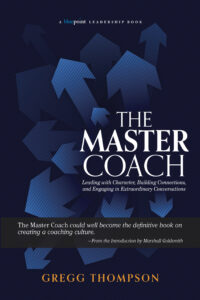Unlock the Talent in Your Team
When I think about a great leader, I inevitably think about someone who is a great coach, understanding my weaknesses, but helping me play to my strengths. From John Wooden to my favorite manager, a coach is someone who unlocks talent.
Gregg Thompson wants to help leaders throughout organizations become great coaches. THE MASTER COACH: Leading with Character, Building Connections, and Engaging in Extraordinary Conversations is his new book, written to help make coaching the part of your culture. He’s the President of Bluepoint Leadership Development and has coached senior leaders in many Fortune 100 companies. I recently talked with Gregg about becoming a master coach.
Share with us the Gregg Thompson definition of a master coach.
A Master Coach is someone who, through their conversations, helps others accelerate their learning and increase their performance. The Master Coach is not an advisor but, rather, a catalyst for sustained personal change in individuals. The Master Coach is a positive and creative force that challenges the person being coached to move from intention to action and holds the person accountable to do that. The Master Coach has highly-tuned interpersonal skills but is much more recognizable by who they are rather than what they do. They are men and women of exceptional integrity, sincere humility, noble intention, and a high degree of emotional intelligence. They take people into uncharted territories, challenge them to consider new perspectives, and help them plot significantly more fruitful paths forward.
Become a Great Coach
What do people get wrong when they think of a great coach?
 People often think of the great coach as someone with the expertise and experience to provide great advice and sage wisdom. While occasionally coaches will have valuable perspectives and insights to share with those they coach, this is not their prime role. Their prime role is to help others find their best answers, solutions, and action plans. Some people also make the assumption that a coach is a counselor. Coaching and counseling, both powerful processes that can help to improve lives, are deeply different. Coaching is dedicating time and attention to help the person being coached to be the best version of themselves going forward while counseling usually involves resolving past difficulties and issues.
People often think of the great coach as someone with the expertise and experience to provide great advice and sage wisdom. While occasionally coaches will have valuable perspectives and insights to share with those they coach, this is not their prime role. Their prime role is to help others find their best answers, solutions, and action plans. Some people also make the assumption that a coach is a counselor. Coaching and counseling, both powerful processes that can help to improve lives, are deeply different. Coaching is dedicating time and attention to help the person being coached to be the best version of themselves going forward while counseling usually involves resolving past difficulties and issues.
What’s the difference between a coach and a mentor?
A mentor can function in a coach-like manner, but their role is more of a career advisor than a coach. The mentor is usually someone with deep knowledge and expertise in a particular field and uses this to help more junior individuals accelerate their development and career growth. Coaching, on the other hand, requires no expertise in the discipline of the person being coached. In short, anyone can coach anyone.
7 Characteristics of a Coaching Culture
What’s a coaching culture?
In organizations that have a true coaching culture, the idea that “leadership happens one conversation at a time” is pervasive. Every conversation at every level is seen as an opportunity for learning and improvement. Here are the seven characteristics of an organization with a coaching culture:
- Talent, high performance and career acceleration are greatly valued.
- People are excited about their personal and professional growth opportunities.
- Leaders are seen as trustworthy, selfless and competent.
- People feel appreciated for their unique contributions.
- Well-intentioned feedback flows readily throughout the organization.
- Promises are readily made and faithfully kept.
- Difficult conversations are routine.
How can leaders best help create an environment like this?
To promote a coaching culture, leaders need to be recognized as authentic and competent leaders who are deeply committed to the success of others. They need to form relationships in which others are inspired, appreciated and held accountable for their own performance. In short, they need to model the qualities and practices of the Master Coach and encourage and equip others in the organization to do so as well.
What are the qualities of a coach?
It is primarily their character that defines the Master Coach. First and foremost, they are known for their integrity and honesty. They also have a passion for learning and development. A coach believes in people’s abilities to learn and change. The coach assumes that people are naturally talented, innately resourceful, and are fully capable of making their own decisions and solving their own problems.
A coach is a genuine optimist. He or she has an exceptionally positive attitude towards the world and the future. The coach sees the future as opportunities to reinvent oneself and contribute at higher levels.
How do the three elements of character, connection, and conversation come together in your model?
Character, Connection and Conversation are the core principles of The Three C Coaching Model created to provide a framework to help all leaders — including executives, middle managers, first line supervisors and individual contributors — rapidly develop solid coaching competencies and immediately apply these in their day-to-day interactions. Character, Connection and Conversation are the timeless dimensions of coaching that leaders need to master as they seek to help others make significant and sustained improvements in their performance and their careers. The exploration of these three critical dimensions of great coaching requires leaders to answer three essential questions: Have I earned the right to coach? Do I establish the kinds of relationships necessary for coaching? Am I willing to engage in the intensely honest conversations that stimulate profound learning, development, and change?
Challenge with Candor
I’d love to talk about constructive confrontation. What’s a courageous encounter? 
The Master Coach cares enough about those they coach that they will do everything they can to help these people have all of the information they need to gain valuable insights, even if it is very difficult (and, in fact, sometimes painful) to hear. Effective coaching requires the coach to challenge others with excruciating honesty and candor. A courageous encounter is when the coach confronts the person’s ideas, perspectives, and assumptions and, in so doing, enables them to move beyond their self-imposed limitations and to find significantly better ways of interacting, functioning and thinking.
When is it time for the coach to move on to another client?
Learning is a career-long and life-long process, and coaching is one of the best ways to facilitate this process. The journey, however, is not a steady uphill climb but encounters plateaus from time-to-time where the traveler stops to rest, gather their strength and prepare for the next mountain. It is at these plateaus that the coach disengages, always being ready to restart the conversation when the journey resumes.
For more information, see THE MASTER COACH: Leading with Character, Building Connections, and Engaging in Extraordinary Conversations.

